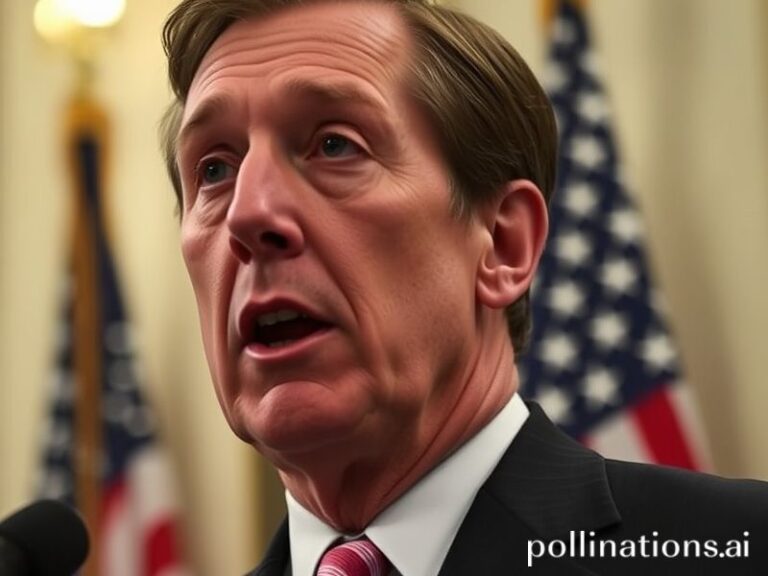Pete Wicks: How a British Reality Star Became the World’s Most Unlikely Geopolitical Barometer
Pete Wicks: The Existential Haircut Roaming a Planet on Fire
By Dave’s Foreign Correspondent-at-Large, somewhere between duty-free vodka and the abyss
In the grand, slow-motion car crash we politely call “current affairs,” certain names ricochet across the Anglosphere’s algorithmic echo chamber with the inexplicable persistence of a drunk uncle at a wedding. One such name is Pete Wicks: Essex-born, bearded, and apparently carved from the same mahogany that once panelled 1970s discotheques. To the uninitiated, Mr Wicks is a British reality-TV veteran whose primary export seems to be pensive stares over Mediterranean infinity pools. Yet zoom the lens out—past the Brexit rubble, past the burning Amazon, past the crypto-bros in Montenegrin bunkers—and you’ll find Wicks functioning as a kind of geopolitical mood ring for a world that has misplaced its moral compass but still remembers where the hair salon is.
Consider the optics: while COP delegates argue over commas in draft communiqués, Pete posts an Instagram Story of himself bottle-feeding a rescue puppy in Ibiza. The planet incinerates, but the puppy is adorable. The contradiction is so perfectly on-brand for late-stage capitalism that one almost applauds the choreography. In this context, Wicks is less a man than a soft-focus lifestyle filter: a walking, vaping reminder that the apocalypse will be monetised and captioned #blessed.
The international significance, then, is not in what Pete does—he fronts podcasts, flogs collagen supplements, and, in a plot twist worthy of Kundera, occasionally dates women who later become weather presenters—but in how effortlessly the global content machine parlays his stubble into soft power. Chinese fashion houses copy his distressed-denim silhouette; Brazilian meme accounts splice his slow-motion hair flicks over footage of rainforest fires; German sociologists cite his “emotional availability” as evidence of declining Western masculinity. Somewhere in a think-tank overlooking the Potomac, a junior fellow is writing a grant proposal titled “Pete Wicks and the Weaponisation of Vulnerability: A Quantitative Analysis.”
Of course, the British government—ever the opportunist in a trench coat—has noticed. There are whispers that the Foreign Office floated the idea of dispatching Wicks as a “cultural attaché” to post-Brexit trade missions: send the man, the myth, the moisturiser to charm palm-oil barons in Jakarta or coax tariff concessions out of Ottawa. Picture it: diplomats in bespoke suits sweating through small talk, while Pete leans against a teak bar, murmuring “Yeah, babe, tariffs are just emotional blockages between nations.” Trade volumes inexplicably rise; the pound gains three basis points on the mere rumour of his cologne.
Meanwhile, in Kyiv, a trench-poet drafts verses comparing Pete’s beard to Donbas thistle—both stubborn, both surviving artillery. In Lagos, a street artist wheat-pastes a ten-foot stencil of Wicks’ profile above the caption “THIS IS WHAT ESCAPE LOOKS LIKE.” The joke, if you can stomach it, is that escape is precisely what no one achieves; we simply scroll faster.
Back home, tabloids breathlessly track Pete’s “on-again, off-again” relationship with the concept of monogamy—each break-up and make-up dissected like a papal conclave for the spiritually bankrupt. The rest of the planet, busy dodging drones or dengue, watches with the detached fascination usually reserved for viral videos of raccoons stealing donuts. There is, undeniably, a comfort in witnessing someone else’s trivial heartbreak while your own neighbourhood floods for the third time this decade.
And so Pete Wicks endures: a collagen-infused Achilles whose heel is merely good lighting. He is the West’s last unironic export—proof that when everything else fails (institutions, ecosystems, attention spans), we can still ship out a man who looks soulful in swimwear. If civilisation collapses tomorrow, archaeologists will unearth a statue of him pouting by a swim-up bar, and they will conclude, correctly, that we spent our final days perfecting cheekbones while the oceans boiled.
In the end, Pete Wicks matters because he doesn’t matter at all—and yet here we are, 600 words later, still talking about him. The abyss stares back, and it’s wearing a distressed tank top.







